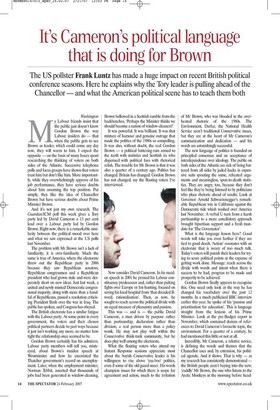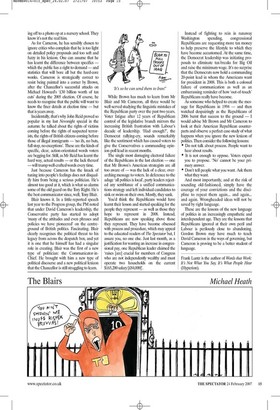It's Cameron's political language that is doing for Brown
The US pollster Frank Luntz has made a huge impact on recent British political conference seasons. Here he explains why the Tory leader is pulling ahead of the Chancellor — and what the American political scene has to teach them both Washington My Labour friends insist that the public just doesn't know Gordon Brown the way Labour insiders do — that when the public gets to see Brown as leader, which could come any day now, they will warm to him I expect the opposite — on the basis of many hours spent researching the thinking of voters on both sides of the Atlantic. Successive telephone polls and focus groups have shown that voters trust him but don't like him. More importantly, while they overwhelmingly approve of his job performance, they have serious doubts about him assuming the top position. Put simply, they like the idea of Chancellor Brown but have serious doubts about Prime Minister Brown.
And it's not just my own research. The Guardia/111CM poll this week gives a Tory party led by David Cameron a 13 per cent lead over a Labour party led by Gordon Brown. Right now, there is a remarkable similarity between the political mood over here and what we saw expressed at the US polls last November.
The problem with Mr Brown isn't a lack of familiarity; it is over-familiarity. Much the same is true of America, where the electorate threw out the Republican party in 2006 because they saw Republican senators, Republican congressmen and a Republican president who had grown stale and were desperately short on new ideas. Just last week, a united and newly minted Democratic congressional majority, along with more than a handful of Republicans, passed a resolution criticising President Bush over the war in Iraq. The public has spoken, and Congress has obeyed.
The British electorate has a similar fatigue with the Labour party. At some point in every government, the voters and their chosen political partners decide to part ways because it just isn't working any more, no matter how tight the relationship once seemed to be.
Gordon Brown certainly has his admirers. Labour party members will tell you, mistyeyed, about Brown's maiden speech at Westminster and how he excoriated the Thatcher government's record on unemployment. Later, when the employment minister, Norman Tebbit, asserted that thousands of jobs had been generated in window-cleaning, Brown bellowed in a Scottish rumble from the backbenches, 'Perhaps the Minister thinks we should become a nation of window-cleaners!'
It was powerful. It was brilliant. It was that mixture of humour and genuine outrage that made the politics of the 1980s so compelling. It was also, without doubt, the real Gordon Brown — a political battering-ram armed to the teeth with statistics and Scottish ire who dispensed with political foes with rhetorical relish. The trouble for Mr Brown is that it was also a quarter of a century ago. Politics has changed. Britain has changed. Gordon Brown has not changed, say the floating voters I've interviewed.
Now consider David Cameron. In his maiden speech in 2001 he praised his Labour constituency predecessor and, rather than picking fights over Europe or fox-hunting, focused on saving his local hospital from 'that dreaded Rword, rationalisation'. Then, as now, he sought to reach across the political divide with an equal measure of pleasantry and passion.
This was — and is — the public David Cameron, a man driven by purpose rather than partisanship, declaration rather than division, a real person more than a policy wonk. He may not play well within the Conservative think-tank community, but he does play well among the electorate.
What the floating voters who attend my Instant Response sessions appreciate most about the boyish Conservative leader is his willingness to rise above `yaa-boo' politics, even if some of the old guard sneer. His words champion issues for which there is scope for agreement and action, much to the irritation of Mr Brown, who was blooded in the overheated rhetoric of the 1980s. The Environment, Darfur, the National Health Service aren't traditional Conservative issues, but they are at the heart of Mr Cameron's communication and dedication — and his words are astonishingly successful.
The new language of politics is founded on principled consensus and an acceptance of interdependence over ideology. The public on both sides of the Atlantic are sick of being battered from all sides by jaded hacks in expensive suits spouting the same, reheated arguments and meaningless, spun-to-death statistics. They are angry, too, because they don't feel like they're being listened to by politicians who place rhetoric ahead of results. Look at Governor Arnold Schwarzenegger's remarkable Republican win in California against the Democratic tide which washed over America last November. A verbal U-turn from a harsh partisanship to a more conciliatory approach brought bipartisan support and a fresh mandate for The Governator'.
What is the language lesson here? Good words will take you even further if they are tied to good deeds. 'Action' resonates with an electorate that is weary of too much talk. Today's voters will punish their leaders for trying to score political points at the expense of getting work done. Message: reach across the divide with words and intent when there is success to be had, progress to be made and prosperity to be achieved.
Gordon Brown finally appears to recognise this. One need only look at the way he has changed his vocabulary over the past 12 months. In a much-publicised BBC interview earlier this year, he spoke of his 'passion and prioritisation for education'. This is language straight from the lexicon of his Prime Minister. Look at the pre-Budget report in November, which contained dozens of references to David Cameron's favourite topic, the environment. For a quarter of a century, he had mentioned this little or not at all.
Incredibly, Mr Cameron, a relative novice, is defining the words and themes that the Chancellor uses and, by extension, his political agenda. And it shows. That is why — as my research has consistently demonstrated — the British people aren't buying into the new, 'cuddly' Mr Brown, the one who listens to the Arctic Monkeys in the morning before heading off to a photo op at a nursery school. They know it's not the real him.
As for Cameron, he has sensibly chosen to ignore critics who complain that he is too light on detailed policy proposals and too soft and fuzzy in his lexicon. One can assume that he has learnt the difference between specifics — which the public has a right to demand — and statistics that will bore all but the hard-core wonks. Cameron is strategically correct to resist being painted into a corner by Brown, after the Chancellor's successful attacks on Michael Howard's '£30 billion worth of tax cuts' during the 2005 election. Of course, he needs to recognise that the public will want to know the finer details at election time — but that is years away.
Incidentally, that's why John Reid proved so popular in my last Newsnight special in the autumn: he talked about the rights of victims coming before the rights of suspected terrorists, the rights of British citizens coming before those of illegal immigrants — `no ifs, no buts, full stop, no exceptions'. These are the kinds of specific, clear, action-orientated words voters are begging for. Still, as Mr Reid has learnt the hard way, actual results — or the lack thereof —will trump well-crafted words every time.
Just because Cameron has the knack of tuning into people's feelings does not disqualify him from being a serious politician. He's almost too good at it, which is what so alarms some of the old guard on the Tory Right. He's the best communicator since, well, Tony Blair.
Blair knows it. In a little-reported speech last year to the Progress group, the PM noted that under David Cameron's leadership, the Conservative party has started to adopt 'many of the attitudes and even phrases and policies we have pioneered' on the centreground of British politics. Fascinating. Blair clearly recognises the political threat to his legacy from across the despatch box, and yet it is one that he himself has had a singular role in creating. Blair was the first of a new type of politician: the Communicator-inChief. He brought with him a new type of political discourse and a new political lexicon that the Chancellor is still struggling to learn.
While Brown has much to learn from Mr Blair and Mr Cameron, all three would be well-served studying the linguistic mistakes of the Republican party over the past two years. Voter fatigue after 12 years of Republican control of the legislative branch mirrors the increasing British frustration with Labour's decade of leadership. 'Had enough?', the Democrat rallying-cry, sounds remarkably like the sentiment which has caused voters to give the Conservatives a commanding opinion-poll lead in recent months.
The single most damaging electoral failure of the Republicans in the last election — one that Mr Brown's American strategists are all too aware of — was the lack of a clear, overarching message to voters. In deference to the adage 'all politics is local', party leaders rejected any semblance of a unified communications strategy and left individual candidates to sink or swim on their own. Mostly, they sank.
You'd think the Republicans would have learnt their lesson and started speaking for the people they represent — as well as those they hope to represent in 2008. Instead, Republicans are now speaking above those they represent. They have become obsessed with process and procedure, which may appeal to the educated readers of The Spectator but, I assure you, no one else. Just last month, as a justification for wanting an increase in congressional pay, one Republican leader claimed the 'raises [are] crucial for members of Congress who are not independently wealthy and must operate two households on the current $165,200 salary [£84,0001.
Instead of fighting to rein in runaway Washington spending, congressional Republicans are requesting more tax money to help preserve the lifestyle to which they have become accustomed. At the same time, the Democrat leadership was initiating proposals to eliminate tax-breaks for Big Oil and raise the minimum wage. It's no surprise that the Democrats now hold a commanding 20-point lead in whom the Americans want for president in 2008. This is both a colossal failure of communication as well as an embarrassing reminder of how 'out-of-touch' Republicans really have become.
As someone who helped to create the message for Republicans in 1994 — and then watched despairingly as the Republicans of 2006 burnt that success to the ground — I would advise Mr Brown and Mr Cameron to look at their American Republican counterparts and observe a perfect case-study of what happens when you ignore the new lexicon of politics. Then consider the following lessons: • Do not talk about process. People want to hear about results.
• It is not enough to oppose. Voters expect you to propose. 'No' cannot be your primary answer.
• Don't tell people what you want. Ask them what they want.
And most importantly, and at the risk of sounding old-fashioned, simply have the courage of your convictions and the discipline to repeat them again.., and again... and again. Wrongheaded ideas will not be saved by right language.
These are the lessons of the new language of politics in an increasingly empathetic and interdependent age. They are the lessons that Republicans ignored at their own peril and Labour is perilously close to abandoning. Gordon Brown may have much to teach David Cameron in the ways of governing, but Cameron is proving to be a better student of language.
Frank Luntz is the author of Words that Work It's Not What You Say, It's What People Hear (Hyperion).























































 Previous page
Previous page